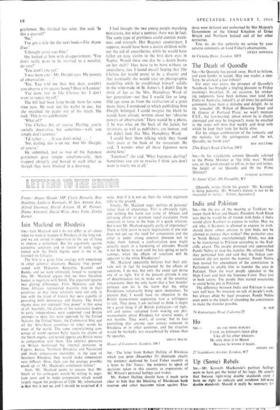R . E'rENO `TH
From : Angus Maude, MP, Cicely Howells, Roy Boulting, Ludovic Kennedy, H. Sen. Antony Jay, Alfred Sherman, David Ashton, M. W. Palmer, Diana Atwood, David Wise, Amy Tube. Zenka Bartek.
lain Macleod on Rhodesia
,it,—lain Macleod and I do not differ at all about what we want to happen in Rhodesia in the long run. and we are united in opposition to the use of force to impose a settlement. But his arguments against economic sanctions and in favour of early nego- tiation with the Smith regime seem to me to be founded on fallacies.
The first is a quite false analogy with experience in other colonial situations. Because 'true power' rested with Makarios, Kenyatta, Kaunda and Banda, and we were ultimately forced to recognise this, Mr. Macleod argues that we must therefore hasten to negotiate with Smith. The argument ignores two glaring differences. First. Makarios and the three Africans represented majority rule in their countries, so that these solutions were not only in line with the trend of history but were capable of providing both democracy and finality. The Smith regime does not represent 'true power' in this sense at all. Secondly, the claims of the nationalist leaders to early independence were supported (and British attempts to deny this were opposed) by the United Nations. the United States, the Communist bloc and all the Afro-Asian countries—in other words by most of the world. The same overwhelming con- sensus of world opinion flatly rejects the claims of the Smith regime, and would oppose any British move to compromise with them. The external pressures on Britain reinforced the internal pressures in Cyprus. Kenya. Northern Rhodesia and Nyasaland and made concessions inevitable; in the case of Southern Rhodesia they would make ceine,essions very difficult. How, then, can the analogy possibly stand up, or Mr. Macleod's conclusion follow?
Next, Mr. Macleod seems to assume that Mr. Smith or his colleagues would be willing to nego- tiate soon and to make concessions which would largely negate the purposes of UDI. My information is that this is not so, and I should be surprised if it
were. And if it is not so, then the whole argument falls to the ground.
Finally, Mr. Macleod urges 'politics of patience' rather than of impatience. This is obviously right, and nothing but harm can come of African and left-wing efforts to promote rapid escalation from sanctions to force in the hope of a quick solution. But is not Mr. Macleod equally guilty of impatience? There is little point in early negotiations if one side does not yet see the need for concessions and the other is under strong external pressure not to make them. Indeed, a confrontation now might actually result in a hardening of attitudes. Would it not be better to wait until the late spring or early summer, when the effects of sanctions will be apparent to the white Rhodesians?
Mr. Macleod apparently believes that their atti- tude will in fact be toughened by the effects of sanctions. I do not, but only the event can prove one of us right. Yet if the present attitude is one of determination not to make any of the essential concessions, then the only harm that a few months' patience can do is the harm that the white Rhodesians voluntarily bring upon themselves. To prevent that, I would have no objection to the British Government expressing now a willingness to talk. That done, I am inclined to think it might be a good thing if all British politicians—of right, left and centre—refrained from making any pro- nouncements about Rhodesia for several weeks, if not months. They won't, of course; but in fact everything that anyone says annoys someone in Rhodesia or in other countries, and the situation would be markedly less exacerbated by silence than by speeches.
ANGUS MAUDE
House of Commons, London. SW!






























 Previous page
Previous page